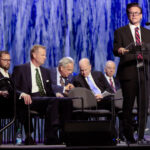

The Baptist seminary in Guatemala was previously on the verge of shutting down, but a partnership with the Patterson Center for Global Theological Innovation has given it new life. Photo by Matt Miller/SWBTS.
Fewer than ten years ago, the Baptist seminary in Guatemala City was on the verge of closing its doors. Its library’s bookshelves were nearly bare; its greatest technological resources were decades-old computers; and its roof had decayed to the point that classes could not be held during the rain lest students become drenched by the impertinent dripping. Beyond that, the seminary’s reach was limited, leaving would-be ministers who lived far from campus with no option but to fend for themselves. If the seminary could not find help, it would have to close indefinitely.
The solution, it turned out, was international collaboration. Specifically, the Guatemala seminary found new life through its partnership with the Patterson Center for Global Theological Innovation (GTI).
GTI is a program of Southwestern Baptist Theological Seminary that aims to strengthen theological education around the world by forming strategic partnerships with seminaries and Baptist conventions overseas. The partnership with the Guatemala seminary was among GTI’s first, and it has yielded substantial results: Southwestern contributed electronic library resources; the First Baptist Church of Bowie, Texas, was recruited as a ministry partner (or “Champion Church”), and its members provided funds to purchase a new computer server and replace the seminary building’s roof; and Southwestern professors taught courses to the seminary faculty, enabling them to earn master’s degrees.
All of these factors combined empowered the Guatemala seminary to return from the brink of desolation as a thriving center for theological education. Beyond improved resources at the seminary itself, seven extension centers have since been opened throughout the country as well as in neighboring Honduras and Belize. The seminary has indeed experienced new life, and they are now moving ever closer to their ultimate goal of equipping students to preach the Word and reach the world.
The partnership with the Guatemala seminary is just one of sixty-seven partnerships that GTI has established since its beginning in 2012. These partnerships reach more than 140 campuses and extensions and span fifty-one nations and five continents. While the exact parameters of each relationship may differ, as some seminaries require more help than others, each one nevertheless represents an effort to prepare God-called men and women to fulfill the Great Commission by reaching the nations with the Gospel of Jesus Christ.
“Southwestern recognizes the fact that theological education is the lifeblood of the work of the church,” says GTI Director Brent Ray. “It is the framework upon which all other Christian ministry depends. Where the Word is not accurately handled (2 Timothy 2:15), the church becomes anemic and falters in its mission.
“We must constantly seek to reach, teach, equip, and mobilize the next generation of Christian leaders. For without sound, biblical, theological education, the church is ultimately condemned to mediocrity and insignificance in the fulfillment of God’s redemptive plan and purpose. It is, therefore, the mission of global theological education to both strengthen and accompany the mission of the church in fulfilling God’s mission on this earth.”
Over the last several years, GTI has reached such diverse nations as Cuba, Ecuador, Portugal, Lebanon, and the Philippines. The partnership with Cuba—GTI’s first—was initiated by the Cuban seminary itself.

A view from the entrance to the Baptist seminary in Havana, Cuba. The first seminary to partner with GTI, the school aims to “put the world at the feet of Jesus” by equipping pastors and missionaries to reach “Cuba for Christ.” Photo by Adam Covington/SWBTS.
Difficult times in the country’s history, a general lack of resources, and a sense of loneliness caused by feelings of separation from fellow believers around the world left Christians in Cuba, particularly those connected to the Baptist seminary in Havana, feeling discouraged. For a time, the seminary’s enrollment comprised only one student. Realizing their need for outside help, the Havana seminary contacted Southwestern and requested that their professors come to Cuba in order to aid the Havana seminary professors in earning master’s degrees and then starting a missions school.
Southwestern obliged, and this partnership quickly blossomed. Not only did the professors earn master’s degrees, but the seminary also established a missions school as well as schools for education, youth ministry, and worship. In addition, Southwestern connected the seminary to resources necessary for creating extension centers outside Havana.
As a result of these and other efforts, the Havana seminary now offers degrees in multiple areas of ministry, has seen enrollment climb to more than eight hundred students, has opened eleven extensions around the country, and has aided, directly or indirectly, in planting thousands of house churches.
“We believe that our strategy for reaching the world for Christ is only possible when all of us in different parts of the world unite to reach this purpose,” says Carlos Miguel, dean of students at the Havana seminary. “And this becomes possible when we educate our leaders in a proper way, when we are involved in missions with a sound theology, and when we attain a healthy growth in missions. That’s why a partnership of this kind makes it possible to put the world at the feet of Jesus Christ through the preaching of the Gospel.”
Integral to GTI’s ministry are Champion Churches—mission-minded congregations who partner with an overseas seminary in order to meet that institution’s needs. While GTI handles the academic side of things, Champion Churches cover the practical—providing library and technological resources, funding students, aiding in building projects, etc.

Through the Patterson Center for Global Theological Innovation—now active in 51 countries—11 Ecuadorian students, three of whom are pictured here with missionary John Thompson (far left), are enrolled in online studies through Southwestern Seminary to become an Ecuadorian seminary’s faculty nucleus. Photo by Adam Covington/SWBTS.
Tabernacle Baptist Church in Ennis, Texas, for example, has become a Champion Church for PESCA Baptist Theological Seminary in Ecuador. PESCA seminary, located in the Andes Mountains in the middle of the country, will train leaders who previously lacked access to doctrinally sound theological education. Before it can open, however, its professors need to be trained. Tabernacle, therefore, has provided funding for these eleven professors to enroll in Southwestern Seminary’s online master’s in theological studies program, which will equip them to serve as PESCA seminary’s faculty.
In addition, Tabernacle plans to send mission teams to Ecuador to complete various projects for the seminary as needed, cover the costs of travel for pastors to attend the seminary, and accomplish other tasks about which they learn along the way. As Todd Gray, pastor of Tabernacle Baptist Church, says, the seminary provides the passion, wisdom, and education; the Champion Church provides support and resources that God uses to make the education happen.
Professor of Missions at Southwestern Seminary Daniel Sanchez, one of the founders of GTI, says it is greatly rewarding to see how God is impacting the entire world through GTI’s efforts.
“Every time I visit these seminaries, I just marvel at the students who are there, whom the Lord is calling to ministry, and the kinds of ministries in which they are involved,” Sanchez says. “The vast majority of these students are pastoring churches or are serving in ministries within the church. And so we see, then, that [theological education] is not just about imparting knowledge, but equipping people for ministry.”




















